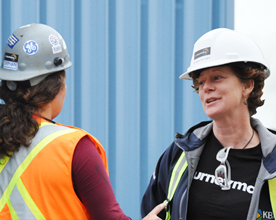Do you need a new approach to generating revenue? Do you have a program that you want to continue after your grant runs out? Then business planning may be the answer. This online course helps you understand the basics of business planning and determine if writing a business plan is appropriate for your public health program.
Estimated time to complete: 45 minutes

Do you have an idea for a new revenue-generating program or a program for which you want to write a business plan? This online course takes a little over an hour and guides you through the process of creating a feasibility plan, a necessary step before writing a full business plan, to determine whether your idea is worth pursuing. The course covers what to consider when writing your feasibility plan and which sources will provide pertinent information.
Feasibility Planning for Public Health Business Plans is the second in a two-part series on public health business plans. The first part is titled, Business Planning for Public Health Programs.
Estimated time to complete: 1.25 hours

As the public health workforce changes, mentoring matters now more than ever. In this course, you will explore the roles, responsibilities, and functions of successful public health mentoring programs, with a focus on equity-centered practices. Using scenario-based examples, interactive exercises, and video tutorials, this course provides mentors, mentees, and program administrators with the tools and resources to succeed in mentoring, no matter the size or type of program.
Estimated time to complete: 1 hour
Learning objectives:
- Determine the specific framework and type of mentoring program that fits your public health agency.
- Describe appropriate matching and evaluation strategies needed to design sustainable mentorship programs.
- Apply best practices for leadership development of mentors through the use of Individual Development Plans.
- Identify effective goal-setting procedures for mentees in formal mentoring programs.
- Apply principles of equitable and inclusive mentoring in formal and informal mentoring scenarios.

SMART women are building a path for all women to thrive in the construction industry. But as any tradeswomen knows, there are still many challenges to confront in the industry, from safety risks, to discrimination and harassment, and fewer opportunities to lead in the field.
More than ever, today's tradeswomen need to rely on each other to share knowledge, support one another, and create leadership opportunities that will build a safer, more equitable industry for all. In short, that means SMART mentorship.

Funding public health activities can be challenging. This course is designed to help public health professionals pull together the key elements needed to secure funding for public health projects and programs. Using case examples, interactive exercises, and video demonstrations, the course walks participants through the process of responding to governmental and private funding opportunities. A workbook accompanying the online course allows participants the opportunity to apply each step of the process to a project or program in their own organization.
Estimated time to complete: 1.25 hours

Good planning can make all the difference in creating a successful public health project. Project planning can be thought of as a series of specific steps, keys to success that will help projects of all types run smoothly and effectively. You don't have to be a project management expert to successfully plan a project. If you carefully think things through and use common sense, your plan can provide a solid foundation for your project and help you make and communicate important decisions.
Estimated time to complete: 1.5 hours
